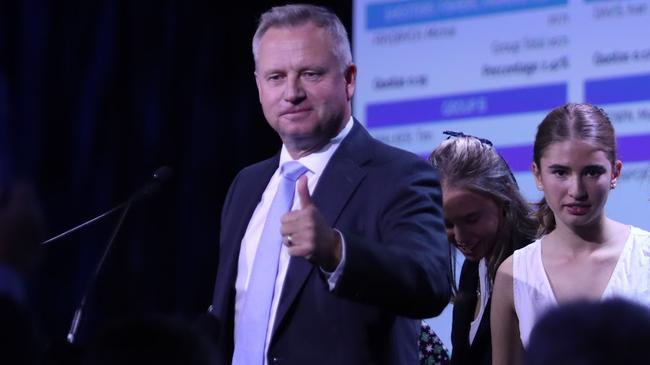Tasmania elects hung parliament as Greens surge, Jacqui Lambie looms
Australia’s last governing Liberal Party is likely to fall at least three seats short of a majority amid a strong Greens vote.

Tasmania is on track for a hung parliament, with Australia’s last governing Liberals claiming victory but likely to fall at least three seats short of a majority.
Liberal Premier Jeremy Rockliff on Saturday night virtually claimed victory, saying Labor had not secured enough seats “to form a cabinet, let alone a government”.
“Today … looks like a fourth consecutive win for the Liberal Party,” Mr Rockliff told a crowded tally room in Hobart.
He said he would seek to work with the parliament elected to provide “stability” for the state, but did not indicate which parties or independents would support the Liberals.
Mr Rockliff appeared to pre-empt any decision the Governor Barbara Baker may make after cross-party talks by insisting the Liberals would govern.
“Let’s be clear here, the Liberal team has clearly gained the most votes in this election, and the most seats – by a large margin,” he said.
He accepted “Tasmanians have delivered a message”. “And I want to assure you all, we’ve heard it,” he said. “But Tasmanians have not voted for a change of government.”
An analysis of results with 60 to 77 per cent of the vote counted in the state’s five multi-member electorates points to the Liberals holding 13 to 15 seats, Labor 10 to 11, and the Greens 4 to 6.
The fledgling Jacqui Lambie Network appears to have won two seats and has a chance of gaining a third, with up to three independents in the running for seats.
If reflected in the final count, such a result would leave the two major parties scrambling to win the support of minor parties and independents to govern.
While the incumbent Liberals will have the most seats, the likely crossbench would appear more sympathetic to Labor, led by Rebecca White, in her third attempt to drag her party out of the political wilderness.
Ms White suggested Labor may be able to form a government. “Labor will be ready to work with the parliament to implement our agenda...if that is the will of the people,” Ms White said.
She said the election result was a clear “vote for change” but that it would take weeks to determine the final make-up of the parliament and who would govern.
“There is a lot that is unclear about tonight but it is clear that Tasmanians have voted to reject the Liberals,” she said.
“There are still votes to be counted but what is clear is that the Liberal Party will not be getting a majority. Tasmanians have humbled a premier who called an early election expecting to be returned in a majority.”
Greens leader Rosalie Woodruff said her party’s strong showing reflected public anger at failing health services, the proposed new Hobart AFL stadium and native forest logging.
“Things aren’t cut and dried right now but they are sure looking good for the Greens,” she said.
Dr Woodruff did not say who her party would support to govern, but has previously made it clear she wanted to see a “change of government”.
A large field of independents has so far not gained the traction some polls had forecast, although incumbent Kristie Johnston appears to be competing with Greens candidate Helen Burnett for the last seat in Hobart-based Clark.
Former Labor leader-turned-independent David O’Byrne is a strong chance in southern Franklin, while maverick fisherman Craig Garland is not entirely out of the question in Braddon.
Barring any surprises in the count of remaining primary votes, it appears likely a result will have to await the distribution of preferences from April 2.
Former Howard-era federal minister Eric Abetz appears set for a switch to state politics, polling strongly for the Liberals in Franklin.
Both major parties have ruled out trading ministries or policies to secure the backing of crossbench MPs, but have promised to make minority government work.
The Liberals, in power since 2014, have suffered a major swing against them, with a statewide primary vote of about 36 per cent, down from about 48 per cent at the 2021 state election.
Labor’s vote has risen slightly from 2021 to about 29 per cent, while the Greens has risen from about 12.5 per cent in 2021 to 14 per cent this election.








To join the conversation, please log in. Don't have an account? Register
Join the conversation, you are commenting as Logout